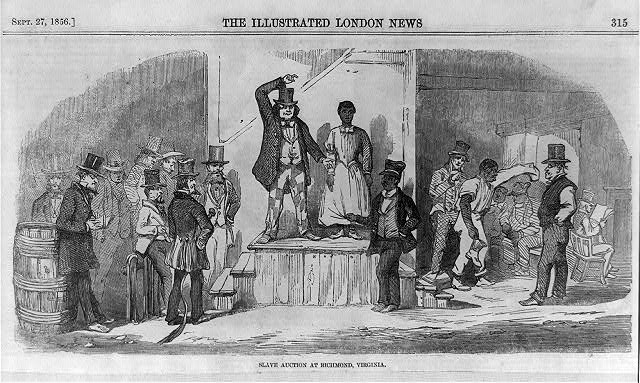Bacon v. Commonwealth, 48 Va. 60 (Va. 1850) is an example of how state courts in the South (in this case the Virginia Supreme Court) prior to the Civil War often interpreted provisions within their constitutions in a liberal fashion that protected rights that are also listed in the First Amendment to the U.S. Constitution
States pass laws restricting anti-slavery speech
In the years leading up to the Civil War, southern states enacted many laws attempting to suppress criticisms of slavery, particularly abolitionist speech and literature.
At the national level, concerns that such literature might stir slave revolts was reflected in controversies over whether Congress had power to abolish slavery, whether it should accept petitions calling for an end to slavery, and whether postmasters should be able to prevent what they considered to incendiary abolitionist mail from being delivered.
Although some politicians argued that the rights to religious exercise and free expression were natural rights that should be free of all governmental control, the First Amendment was directed specifically to congressional action, and it took many years after the adoption of the 14th Amendment in 1868 before the U.S. Supreme Court began using the due process clause of that amendment to restrict state as well as federal actions relative to First Amendment freedoms.
The adoption of state bills or declarations of rights had, however, actually preceded the adoption of the First Amendment, and, even in slave states, courts often interpreted them liberally. One of the most important and influential of these had been the Virginia Declaration of Rights, which has been particularly strong in its support of freedom of the press and religion.
This Declaration gave courts considerable leeway in questioning repressive speech laws. Bacon v. Commonwealth, in turn, has been described as “decidedly the most important of these cases involving the freedom of speech” (Eaton 1940, 133).
Virginia pastor convicted for criticizing slave-owning
The Bacon case arose when Jarvis C. Bacon, a pastor, was indicted for giving a sermon the Sunday before Christmas in 1848 in Grayson County, Virginia. In this sermon, which was based on scriptures urging Christians to be salt and light in the world, Bacon also applied Jesus’ description of the money changers in the temple as robbers to those in his congregation who owned slaves.
Further comparing an individual who would steal corn from a neighbor’s crib to those who held slaves, he said that it was “worse to take a human being and keep him all his life, and give him nothing for his labour, expect once in a while a whipping or a few stripes.”
Bacon was indicted under a provision of Virginia law that provided that “Any free person who, by speaking or writing, shall maintain that owners have not the right of property in their slaves, shall be punished by confinement in the jail, not more than twelve months, and by fine not exceeding five hundred dollars.”
Convicted and fined by the Circuit Court of Grayson County, Bacon appealed to the Virginia Supreme Court, where his sentence was overturned in a decision rendered by Justice John Tayloe Lomax.
Virginia Supreme Court overturns conviction for anti-slavery speech
Lomax observed that “Any statute tending to restrain the exercise of the freedom of speech, or supposed to have such tendency, should be strictly construed by the Courts. This should more especially be the case when the exercise of that freedom has for its object matters of religious doctrine and discipline.”
In pursuing this objective, Lomax distinguished speech intended to point to spiritual principles versus those questioning human laws designed to uphold property rights. He did not think there was evidence to prove that Bacon had questioned the latter in this case. The Court observed that “If it was the design of the defendant in this discourse, to dispute or deny any rights of property, there was no fitness for such a purpose in the indictment cited by him.”
The judge further observed that when Jesus cleansed the temple, “It was not for any crime against the judicial law that he reproved them; but for the spiritual sin of desecrating His father’s house.”
As Lomax further explained, Bacon had described slaveholders within his congregation “as sinners, not as malefactors against any social or civil rights or property.” Lomax rhetorically asked: “If here be any ambiguity in its meaning, why should a Court, guided by the spirit of the constitution, which favours the freedom of speech and of religious faith, reject in this criminal prosecution, this innocent construction, and fasten upon another, that makes such speaking a crime?”
Lomax accordingly ordered a new trial in this case.
A scholar of freedom of thought in the antebellum South observed that “The Court softened the rigor of the law to a degree that almost nullified it, in order that Bacon might be liberated, and perhaps that the honor of Virginia might be vindicated” (Eaton 1940, 134).
John R. Vile is a political science professor and dean of the Honors College at Middle Tennessee State University.

